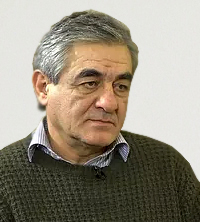
– Prior to the change of power in 2018, the issue of religious freedom in Armenia was one of the major topics of political discourse, but now the issue seems to be in the secondary. What do you think is the reason?
– By 2018, power had been merged not only with large capital but also with the church. We have studied this issue for a long time, and we know that the church was used by the authorities to fill the ideological vacuum created in the country, and it was natural that the attitude of the authorities towards other religious organizations came from the cooperation between the authorities and the Armenian Church. It was natural that a line had to be drawn to the Armenian Apostolic Church, for which it was even constitutionally granted a special status of a structure with a historically significant role in the life of the Armenian people. Other religious organizations, which were also subject to specific qualifications, such as “sects”, “non-nationals,” etc., and a policy at the state level was adopted towards them. Even the medieval thesis that one who is not a member of the Armenian Apostolic Church is not an Armenian is revived, but for some reason it is not. The clergymen were obliged to attend state events, even those of the ruling party. Even the medieval thesis that one who is not a member of the Armenian Apostolic Church is not an Armenian was revived. The clergymen were obliged to attend state events, even those of the ruling party. What changed in 2018? It changed that the new authorities began to distance themselves from religious issues, even at the highest level, publicly speaking of disputes between government and church officials. The prime minister called for the spiritual fathers to behave in a “right” way, stay away from politics, and so on. As a result, the topic of religion was generally excluded from political and public life, or rather left out of public attention. I don’t know if it was good for the church or other organizations or not. It has created a new environment for the church and other organizations, and how they will behave in this new reality is another matter, and I will not touch on that. In short, the religious issue in today’s Armenia has lost its relevance.
– It is not excluded that the power in Armenia will change again and the next power will try to return to the old politics. What systemic or legislative changes are the current authorities taking to prevent such a thing from happening?
– It is difficult to say now what legislative changes need to be implemented. Back then, the state and the government were not bound by law, everything was based on shadow arrangements.
– The current law was adopted in 1991 during the last year of the Soviet Union and does not reflect the current situation. Armenia had made a commitment to the Council of Europe to adopt a new law, but it failed to do so. The Venice Commission has been critical of all the projects. Now seems like the right time to adopt a new law because there are no previous obstacles. There is evidence that the current authorities generally have no idea of this.
– Generally, this problem is ignored today. As there is no problem at this time, this topic has been forgotten. That is why there is no need for a new law. If any tensions arise with this issue, then they will start talking about the new law and new regulations. In fact, tensions in the past were artificially created.
– There is a complicated situation in the Western countries on this issue. There is a growing number of Muslim migrants who have created religious tensions within the community. Movements are emerging that call for restrictions on Islam, saying that European civilization is in danger, but on the other hand, if such restrictions are put in place, European civilization will, in essence, renounce its values, in particular the principle of religious freedom. In fact, the religious issue has become a cause of civilization clashes.
– Over time, the rooting of legal philosophy in all areas of public-political relations has changed the attitude on spiritual matters. It is no wonder that some say that in Europe, unlike the United States, a pagan culture has been formed. There has been a contradiction between post-religious and Islamic civilizations. A generation that has pushed the religious issue out of their lives, making it a purely personal matter, has come up against a community for which religion is a vital issue. This is an unprecedented situation. It is difficult now to imagine what can be done. Rather, we are dealing with the activation of nationalist ideologies and, as a consequence, with the rise of the right-wing radical forces in Europe. That is to say, Islam is not opposed to Christianity but to nationalism.
– Armenia is also a post-religious society, but we still do not have such a problem. Can there be similar situations in the future for us?
– Armenia, in terms of its resources, is not in a situation where many migrants want to come here. The migrants on the other hand are not predominantly Muslim, they are Indian citizens. This is a different situation and it is difficult to predict what developments may be happening to us.